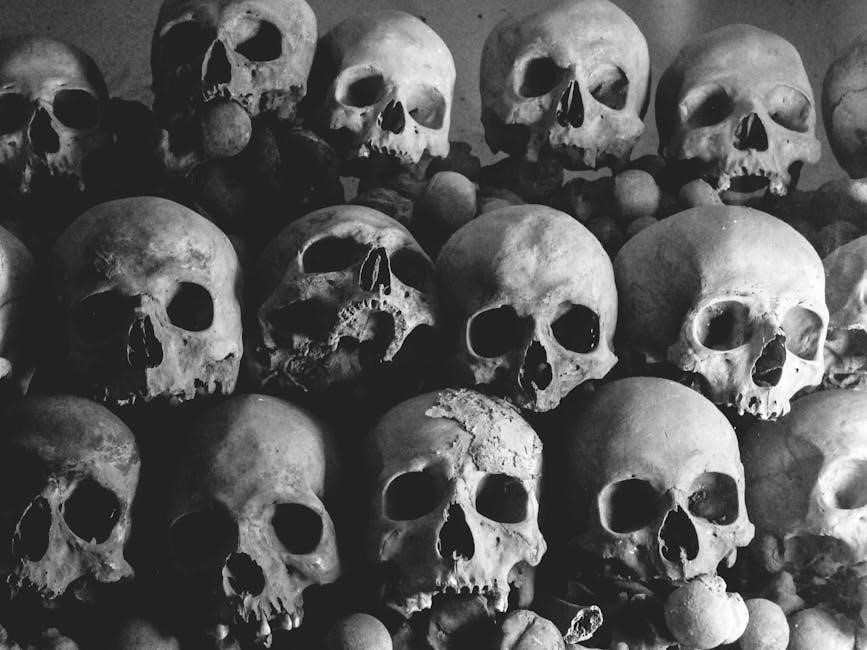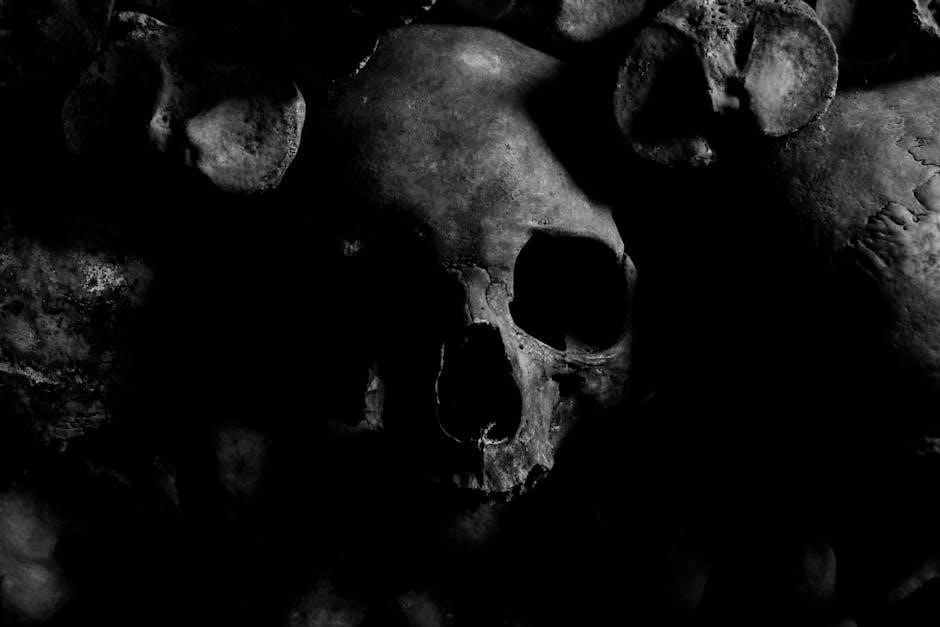Historical Context of Socrates’ Trial
The trial of Socrates occurred in 399 BCE, during a period of political and social upheaval in Athens, following the Peloponnesian War. The city was grappling with economic hardship, political instability, and a growing tension between traditional values and the rise of philosophical inquiry. This backdrop of societal change and suspicion toward intellectuals set the stage for Socrates’ prosecution, as his questioning of authority and unconventional ideas alienated powerful figures in Athenian society.
1.1 Political and Social Climate of Athens
Athens, after the Peloponnesian War, faced economic hardship and political instability, shifting from empire to democracy. Socrates’ trial occurred amidst this turmoil, with societal tensions heightened by the rise of philosophical inquiry. The Athenians, protective of their traditions, viewed Socrates’ questioning of authority and unconventional ideas with suspicion, contributing to the hostile climate that led to his prosecution.
1.2 The Role of the Oracle of Delphi
The Oracle of Delphi declared Socrates the wisest man, prompting his philosophical journey. This proclamation, interpreted as a divine endorsement, drew attention and skepticism. Socrates’ subsequent questioning of Athenian leaders and values, in pursuit of wisdom, fueled resentment and accusations of impiety, directly contributing to his trial and execution.
The Charges Against Socrates
Socrates was charged with impiety and corrupting the youth, accused by Meletus of denying the state gods and introducing foreign divinities. His teachings were seen as subversive, challenging Athenian traditions and authority, leading to a trial that questioned his loyalty to the city’s religious and social norms.
2.1 Impiety and Corrupting the Youth
Socrates was charged with impiety, accused of disrespecting the gods of Athens and introducing foreign deities. His method of questioning authority and encouraging critical thinking led to accusations of corrupting the youth, as his followers often challenged traditional values. These charges, brought by Meletus, Anytus, and Lycon, reflected societal fears of his radical ideas undermining the state’s religious and moral framework.
2.2 The Accusers and Their Motivations
Socrates’ accusers—Meletus, Anytus, and Lycon—represented different interests. Meletus, a young zealot, focused on religious charges. Anytus, a politician, sought to eliminate a perceived threat to democracy. Lycon, a rhetorician, aimed to protect traditional education. Their motivations combined personal grievances, political agendas, and societal fears, driven by Socrates’ reputation for challenging authority and undermining established norms through his philosophical methods.

The Trial of Socrates
The trial involved 501 jurors, with charges of impiety and corrupting the youth. Socrates defended himself, acknowledging his methods but denying wrongdoing, leading to a split vote and eventual conviction.
3.1 The Trial Proceedings and Athenian Law
The trial of Socrates followed Athenian legal procedures, with 501 jurors deciding his fate. The charges of impiety and corrupting the youth were prosecuted under Athenian law. Socrates defended himself, questioning the accusations and employing his Socratic method. The majority vote led to his conviction, and during the penalty phase, the state proposed death, while Socrates suggested exile or continued public engagement.
3.2 The Role of the Jury in Ancient Athens
In Athens, the jury consisted of 501 citizens chosen by lottery, ensuring a broad representation of the populace. Their role was to hear evidence, weigh arguments, and vote on guilt and sentencing. The jury’s decision in Socrates’ case reflected societal tensions, with a majority favoring conviction. Their verdict underscored the democratic process, emphasizing the power of public opinion in legal outcomes.

Socrates’ Defense
Socrates defended himself by explaining his method of questioning and his belief in his divine mission, justifying his actions as a service to the state and its people.
4.1 The Apology and Socratic Method
In his Apology, Socrates employed his signature method of questioning to challenge the charges against him. He argued that his relentless pursuit of wisdom, though unconventional, was a divine mandate to awaken Athens to virtue. By probing the definitions of piety and justice, Socrates exposed the contradictions in his accusers’ arguments, emphasizing the importance of critical examination over blind conformity to societal norms.
4.2 Key Arguments Presented by Socrates
Socrates argued that he was innocent, claiming his actions were divinely ordained to seek wisdom and improve society. He contended that silencing him would harm Athens more than himself, as it would stifle free inquiry and moral growth. Socrates emphasized that he acted with integrity, prioritizing his duty to God over human law, and maintained that his methods benefited the youth rather than corrupting them.
The Verdict and Execution
The verdict led to his execution by drinking hemlock, delayed by the sacred ship’s return, emphasizing his acceptance of death over betraying his principles.

5.1 The Delay and the Sacred Ship

The execution was delayed due to the sacred ship’s annual journey to Delos, honoring Apollo. Athenian law prohibited executions during this period, granting Socrates weeks to engage in profound discussions with followers, emphasizing his beliefs about the soul’s immortality and the importance of adhering to principles, even in the face of death.
5.2 The Method of Execution
Socrates was executed by drinking hemlock, a poisonous plant extract, as was customary in Athens. The hemlock was prepared by the executioner and administered in prison. Socrates accepted the cup calmly, embodying his belief in obeying the law. His followers were present, and their emotional reactions contrasted with his serene acceptance of fate, reflecting his unwavering commitment to principle.

Philosophical Implications
Socrates’ trial highlights the tension between individual freedom and state authority, raising questions about the limits of free speech and the role of philosophy in society. His death underscores the importance of ethical integrity, self-examination, and the pursuit of truth, shaping Western philosophy’s enduring themes of justice and morality.
6.1 Freedom of Speech vs. State Authority
Socrates’ trial exemplifies the conflict between individual freedom of speech and state authority. His refusal to cease questioning societal norms, despite the risk of execution, underscores his commitment to free inquiry. The trial raises fundamental questions about the limits of state power over personal expression and the dangers of silencing dissent, resonating as a timeless philosophical debate on liberty and governance.
6.2 The Concept of the Social Contract
Socrates’ trial highlights the philosophical exploration of the social contract, where citizens implicitly agree to abide by societal laws in exchange for protection and benefits. In Crito, Socrates argues that fleeing Athens would violate this contract, emphasizing his duty to the state despite its unjust verdict. This reflects his deep commitment to the rule of law and the moral obligations binding individuals to their community.
The Role of Plato
Plato, Socrates’ devoted student, meticulously documented the trial and death of his mentor through dialogues like Euthyphro, Apology, Crito, and Phaedo, preserving Socrates’ legacy and philosophical ideals for eternity.
7.1 Plato’s Documentation of Events
Plato meticulously recorded Socrates’ trial and death through dialogues like Euthyphro, Apology, Crito, and Phaedo. These works capture Socrates’ philosophical arguments, his defense against charges, and his final conversations. Euthyphro explores piety, Apology presents his defense, Crito discusses justice, and Phaedo reflects on the soul’s immortality. Plato’s documentation ensures Socrates’ ideas endure, offering profound insights into his teachings and legacy.
7.2 The Influence of Platonic Dialogues
Plato’s dialogues about Socrates’ trial and death profoundly shaped Western philosophy. They introduced the Socratic method, emphasizing critical inquiry and dialogue. These texts not only preserved Socrates’ legacy but also influenced political theory, ethics, and education. The dialogues’ exploration of justice, morality, and the ideal state continues to inspire thinkers, making them foundational in philosophical discourse and education.

Legacy and Impact
Socrates’ trial and death left a profound impact on Western philosophy, inspiring Plato’s dialogues and shaping ideals of justice, free speech, and intellectual integrity for centuries.
8.1 Influence on Western Philosophy
Socrates’ trial and ideas profoundly shaped Western philosophy, emphasizing critical thinking and ethical inquiry. His method of questioning, known as the Socratic method, became a cornerstone of philosophical and educational discourse. Through Plato’s dialogues, Socrates’ concepts of justice, virtue, and the social contract influenced thinkers like Aristotle, Kant, and Enlightenment philosophers, laying the groundwork for modern political and ethical thought.
8.2 Enduring Philosophical Questions
Socrates’ trial and death raised fundamental questions about justice, morality, and the ideal life. His belief in the immortality of the soul and the importance of self-examination challenged conventional wisdom. The trial also highlighted tensions between individual conscience and state authority, sparking debates about civil disobedience and the social contract. These questions remain central to philosophical inquiry and ethical discourse today.

Modern Relevance
Socrates’ trial highlights enduring debates on free speech, civil disobedience, and the social contract, influencing modern political philosophy and educational methods, ensuring his legacy remains vital.
9.1 Contemporary Issues and Socratic Principles
Socratic principles resonate with modern debates on freedom of expression, critical thinking, and moral accountability. His emphasis on questioning authority and seeking truth aligns with contemporary issues like censorship, political correctness, and the role of dissent in democracy. These timeless ideas inspire dialogue on individual rights versus societal expectations, making Socrates’ legacy a cornerstone of ethical discourse today.
9.2 The Trial in Modern Discourse
The trial of Socrates remains a focal point in modern discussions about justice, free speech, and the role of dissent in society. His case is often cited in debates over censorship, academic freedom, and the tension between individual conscience and state authority. Contemporary scholars and thinkers draw parallels between his defense of intellectual liberty and modern struggles for ethical integrity in public discourse.
Key Dialogues
Plato’s dialogues, such as Euthyphro, Apology, Crito, and Phaedo, are central to understanding Socrates’ trial, defense, and final days, offering profound philosophical insights into justice, duty, and immortality.
10.1 Euthyphro, Apology, Crito, and Phaedo
Plato’s dialogues Euthyphro, Apology, Crito, and Phaedo provide a detailed account of Socrates’ trial, defense, imprisonment, and death. Euthyphro explores piety, Apology presents his defense, Crito discusses his refusal to escape, and Phaedo covers his final philosophical discussions. These works are essential for understanding Socrates’ philosophy and his enduring impact on Western thought, offering insights into justice, duty, and the immortality of the soul.
10.2 Significance of Each Dialogue
Euthyphro examines the nature of piety, highlighting Socrates’ method of questioning. Apology showcases his defense, emphasizing free speech and moral integrity. Crito explores civic duty and justice, while Phaedo delves into the immortality of the soul. Together, these dialogues encapsulate Socrates’ philosophy, offering insights into ethics, morality, and the human condition, making them foundational texts in Western philosophy and enduring sources of intellectual inquiry.

Socrates’ View on Death
Socrates viewed death as a natural transition, believing in the immortality of the soul. He accepted death calmly, seeing it as a liberation from the physical body, rather than an end, embodying his philosophical dignity and faith in the afterlife.
11.1 Beliefs on the Soul and Immortality
Socrates believed the soul was immortal, existing before birth and continuing after death. He viewed the body as a prison, with the soul seeking wisdom to reunite with the divine. In Phaedo, he argued for the soul’s immortality through recollection and the theory of forms. Death liberates the soul, allowing it to achieve true understanding and live virtuously, free from bodily distractions.
11.2 Acceptance and Dignity in Death
Socrates faced death with calm acceptance and dignity, believing it was his duty to obey Athenian law. He refused to flee or show fear, demonstrating his commitment to principles. Drinking the poison willingly, he maintained his integrity, teaching that true wisdom lies in accepting fate gracefully and upholding justice, even in death.
Socrates’ trial and death remain a pivotal moment in history, highlighting themes of justice, free speech, and moral integrity. His legacy endures, shaping Western philosophy profoundly.
12.1 Summary of Key Events
Socrates was tried in 399 BCE in Athens, charged with impiety and corrupting the youth. He defended his actions, emphasizing his divine mission and the importance of critical inquiry. The jury found him guilty, and he was sentenced to death. Despite opportunities to escape, Socrates accepted his fate, believing in the social contract and the immortality of the soul, as detailed in Plato’s dialogues.
12.2 Reflection on Lasting Significance
Socrates’ trial and death remain a cornerstone of philosophical discourse, symbolizing the clash between free inquiry and state authority. His unwavering commitment to critical thinking and moral integrity continues to inspire, while his acceptance of death underscores his belief in the immortality of the soul. Plato’s documentation ensured Socrates’ ideas endured, shaping Western philosophy and sparking enduring debates on justice, truth, and the examined life.